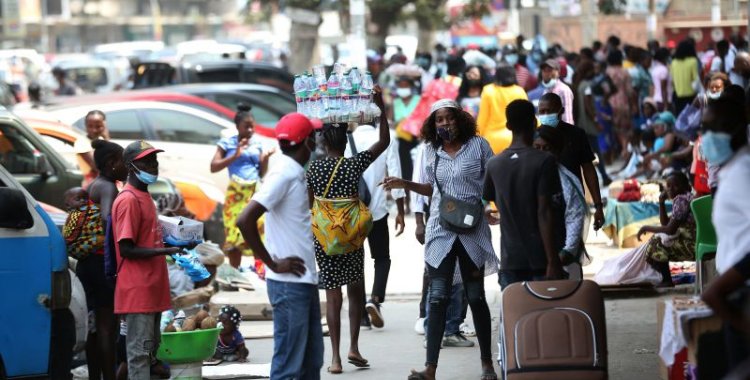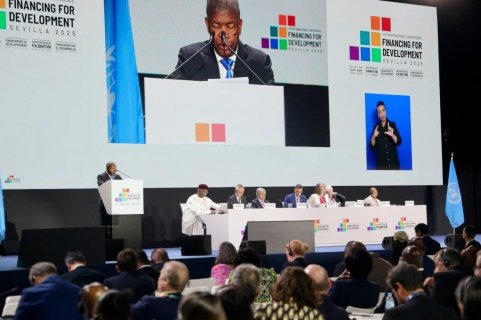João Lourenço was elected on August 23, 2017 as the new President of the Republic to replace José Eduardo dos Santos, following general elections.
Populars in Luanda considered this Monday the country's situation critical, with the "escalating" unemployment and prices of basic food basket products at the center of their concerns, reproaching the current economic policies and fearing for their lives due to the current "squeezes."
"The country is very bad, the way it is the country is not well at all, rice is expensive, we can't buy anything even with 50,000 kwanzas, the basic food basket is bad, life is difficult and it wasn't like before," Ana Domingos tells Lusa.
This street vendor considers that "regardless of some negative situations" the previous president "worked for the stability of the basic food basket", defending that the actions of João Lourenço should also aim for the fall of the price of products.
"It may be that he [João Lourenço] is trying to organize things, but if he tightens things up we will die of hunger," he says.
Sukama Sarmento, 23, business management student at the Faculty of Economics of the Agostinho Neto University (UAN) speaks of a "critical situation" in the country, especially in the economic aspect, stating that citizens "are disappointed" with the government of João Lourenço.
"Every day we live more and more difficulties and the government of João Lourenço does not outline, in my view, strategies that aim to mitigate the situation and the pandemic, only makes things more difficult," says the student.
The non-fulfillment of electoral promises, such as the creation of 500,000 jobs, the transformation of Benguela province into "California," notes Sukama Sarmento, "has disappointed citizens" whose "suffering gets worse every day.
According to the university student, who applauds the recovery of assets as part of the fight against corruption, the assets seized by the state "should serve to improve the socioeconomic condition" of the country, pointing to the "alternation in power as a solution for Angola."
"At this moment, the majority of the population agrees that there should be political alternation, this shows that there is no longer confidence in the current Government, what it has done best is the fight against corruption, but if this fight does not bring improvement to the lower class, then it would not be so a gain," he throws.
The "high rate" of the basic food basket price and the "bad implementation of the economic variables" are for the university student Ricardo dos Anjos Ferreira situations that led the Angolan citizens to "disillusionment with the current Government policies".
Attending the course of accounting and auditing in the Faculty of Economics at UAN, the student, 23, believes that in four years of João Lourenço's election, "not much has changed in the lives of citizens", valuing, however, the economic diplomacy.
"In these four years, I believe that there is more disillusionment of the citizens, I believe that exactly in the life of the citizen in this period not much was reflected, almost nothing changed, the price of the basic basket went up, things became more expensive", he laments.
Ricardo dos Anjos Ferreira also refers that the current governing machine has lost the trust of the citizens, warning for the "non-manipulation of the prices of the basic food basket products" during the campaign for the 2022 elections.
"I believe there is little trust in the governing party," he says, noting that he believes that João Lourenço is a president "with good initiatives, but his party does not make it easy."
"We have to be realistic and take the country's economic issue seriously, because the fame of a president is based on his economic performance, and as long as the basic problems are not overcome, there are no prospects for great results in the elections," says the student.
The difficulties experienced in the last four years were also portrayed by Isabel Dias dos Santos, a seller of "kissangua" (traditional drink made of corn), in the commercial area of São Paulo, in Luanda, who asks for the "reduction of the price of the basic food basket".
"The country is really bad, a lot of people are suffering, a lot of people looking for their daily bread and it's really bad, there's no way", the 44 year old saleswoman says.
"Despite the difficulties," street vendor Ana Domingos also points to the end of "gasosa" (petty corruption) in hospitals and public offices as "positive factors" in the governance of João Lourenço.
Adviser to PR points out setbacks in four years, but also "there are things that have improved
The coordinator of the Political and Social Observatory of Angola (OPSA) pointed out this Monday setbacks in the four years of the mandate of President João Lourenço, but considered unfair to say that the current government is worse than the previous one.
Sérgio Calundungo was making, in declarations to Lusa news agency, the balance of the four years of election of the Angolan Head of State, that is marked today.
"I think that in these four years, if we divide it in several stages, João Lourenço as soon as he came to power brought with him a great glimmer of hope", he said, underlining that João Lourenço started by recognizing "that there were serious cases of corruption, nepotism, abuse of power".
According to the OPSA coordinator, besides having recognized these situations, the commitment with the whole society to fight these issues was important.
"This raised hope, because it was one of the evils that the country faced in the past and faces now, but at that time, before João Lourenço came to power, people linked to the MPLA [Popular Movement for the Liberation of Angola, the ruling party] and the former President of the Republic José Eduardo dos Santos did not publicly recognize that this was occurring in the country. The desperation was greater, because nobody corrects something they don't recognize," he said.







